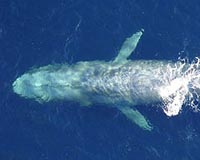| . |  |
. |
London (UPI) Nov 17, 2010 Whales have been observed with skin damage similar to acute sunburn in humans, and the problem is getting worse with time, British researchers say. Scientists from the United Kingdom studied blue whales, fin whales and sperm whales in the Gulf of California to measure the effect of rising levels of ultraviolet radiation on their health, ScienceDaily.com reported Wednesday. Blisters on the skin of whales have been observed for a number of years, and now researchers using high-definition photos to give accurate counts of the blisters and analyzing areas of damage in skin samples say they've found the three species of whale exhibit skin damage commonly associated with acute sunburn in humans. The UV index in the whales' habitat in the Gulf of California fluctuates between high and extremely high throughout the year. "Whales need to come to the surface to breathe air, to socialize and to feed their young, meaning that they are frequently exposed to the full force of the sun," researcher Laura Martinez-Levasseur says. "The increase in skin damage seen in blue whales is a matter of concern, but at this stage it is not clear what is causing this increase," she says. "A likely candidate is rising UVR as a result of either ozone depletion, or a change in the level of cloud cover."
Share This Article With Planet Earth
Related Links Follow the Whaling Debate
 Ozone depletion could be damaging whales' skin: scientists
Ozone depletion could be damaging whales' skin: scientistsParis (AFP) Nov 10, 2010 A closely-studied community of whales, including the threatened blue whale, showed worrying signs of sunburn, possibly because of ozone depletion in the atmosphere, biologists reported on Wednesday. Whales come to the surface to breath, socialise and feed their young, which means the skin on their backs is exposed to the full force of the Sun, sometimes for hours. Scientists from the Zoo ... read more |
|
| The content herein, unless otherwise known to be public domain, are Copyright 1995-2010 - SpaceDaily. AFP and UPI Wire Stories are copyright Agence France-Presse and United Press International. ESA Portal Reports are copyright European Space Agency. All NASA sourced material is public domain. Additional copyrights may apply in whole or part to other bona fide parties. Advertising does not imply endorsement,agreement or approval of any opinions, statements or information provided by SpaceDaily on any Web page published or hosted by SpaceDaily. Privacy Statement |